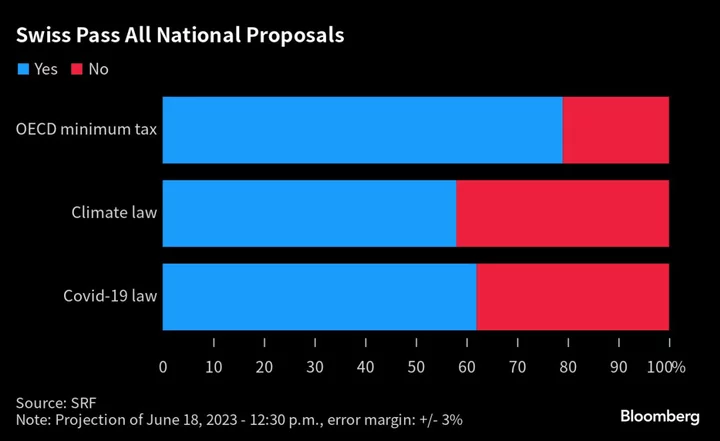Swiss voters are set to back raising corporate taxes for large multinationals to the 15% minimum level agreed by OECD countries. A separate ballot on climate goals is also likely to pass.
The tax increase was supported by 79% of the electorate, according to initial data from national broadcaster SRF and GFS Bern. A vote in favor, which was expected based on polls, clears the final hurdle for its implementation next year.
With the slogan “So the money stays in Switzerland” the government and most parties had been calling for ‘yes’ votes. A rejection of the measure would have allowed other countries to pocket the estimated additional annual revenue of 1 billion to 2.5 billion francs ($1.1 billion to $2.8 billion), according to the OECD agreement.
Swiss citizens were likely swayed by the nature of the topic and the support should not be seen as a vote of confidence in the government, which recently has been under scrutiny over its role in the Credit Suisse Group AG crisis.
Read More: Geneva Voters Turn Down Wealth Tax Increase for Richest 1%
Some 58% backed the government’s proposal for Switzerland to become climate neutral by 2050, based on early figures. The bill includes commitments to cut greenhouse gas emissions at 50% below 1990s levels by the end of this decade.
Under its system of direct democracy, Switzerland is one of a few countries globally to vote on national climate goals. The current law is a softened version of an earlier proposal which would have outright banned fossil fuels but was deemed too extreme by lawmakers and the public.
The third measure on the national ballot — a plan to ensure that Covid measures including monitoring and contact tracing stay ready to be reactivated if necessary — was also supported by voters, initial data show.
In a vote held in Geneva, voters rejected a “solidarity” tax hike for the richest 1% living in Switzerland’s second-largest city. The measure to temporarily lift the wealth tax for individuals owning more than 3 million francs ($3.4 million) aimed to boost fiscal revenue. The local government had spoken out against the increase.
Swiss people head to the polls as often as four times a year, though 2023 will only see this Sunday’s plebiscites. That’s partly because the country holds parliamentary elections on Oct. 22.
(Updates initial data, adds reference to Geneva in penultimate paragraph.)

